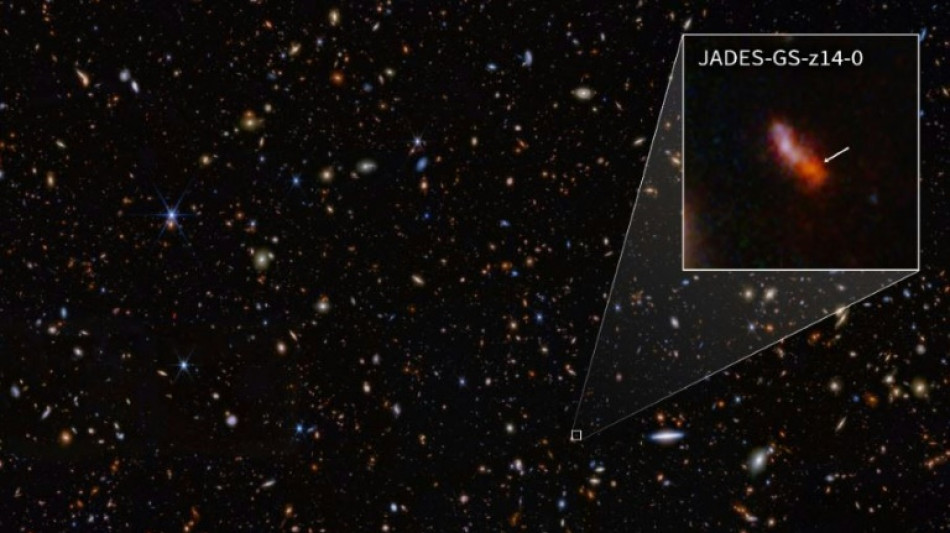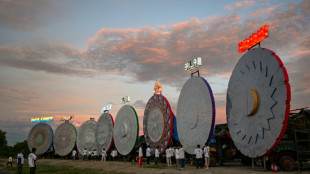
-
 Moscow intent on pressing on in Ukraine: Putin
Moscow intent on pressing on in Ukraine: Putin
-
UN declares famine over in Gaza, says 'situation remains critical'

-
 Guardiola 'excited' by Man City future, not pondering exit
Guardiola 'excited' by Man City future, not pondering exit
-
Czechs name veteran coach Koubek for World Cup play-offs

-
 PSG penalty hero Safonov out until next year with broken hand
PSG penalty hero Safonov out until next year with broken hand
-
Putin says ball in court of Russia's opponents in Ukraine talks

-
 Czech Zabystran upsets Odermatt to claim Val Gardena super-G
Czech Zabystran upsets Odermatt to claim Val Gardena super-G
-
NGOs fear 'catastrophic impact' of new Israel registration rules

-
 US suspends green card lottery after MIT professor, Brown University killings
US suspends green card lottery after MIT professor, Brown University killings
-
Arsenal in the 'right place' as Arteta marks six years at club

-
 Sudan's El-Fasher under the RSF, destroyed and 'full of bodies'
Sudan's El-Fasher under the RSF, destroyed and 'full of bodies'
-
From farms to court, climate-hit communities take on big polluters

-
 Liverpool have 'moved on' from Salah furore, says upbeat Slot
Liverpool have 'moved on' from Salah furore, says upbeat Slot
-
Norway crown princess likely to undergo lung transplant

-
 Iraq negotiates new coalition under US pressure
Iraq negotiates new coalition under US pressure
-
France's budget hits snag in setback for embattled PM

-
 Putin hails Ukraine gains, threatens more, in annual press conference
Putin hails Ukraine gains, threatens more, in annual press conference
-
US suspends green card lottery after Brown, MIT professor shootings

-
 Chelsea's Maresca says Man City link '100 percent' speculation
Chelsea's Maresca says Man City link '100 percent' speculation
-
Dominant Head moves into Bradman territory with fourth Adelaide ton

-
 Arsenal battle to stay top of Christmas charts
Arsenal battle to stay top of Christmas charts
-
Mexican low-cost airlines Volaris and Viva agree to merger

-
 Border casinos caught in Thailand-Cambodia crossfire
Border casinos caught in Thailand-Cambodia crossfire
-
Australia's Head slams unbeaten 142 to crush England's Ashes hopes

-
 Epstein files due as US confronts long-delayed reckoning
Epstein files due as US confronts long-delayed reckoning
-
'Not our enemy': Rush to rearm sparks backlash in east Germany

-
 West Indies 110-0, trail by 465, after Conway's epic 227 for New Zealand
West Indies 110-0, trail by 465, after Conway's epic 227 for New Zealand
-
Arsonists target Bangladesh newspapers after student leader's death

-
 Volatile Oracle shares a proxy for Wall Street's AI jitters
Volatile Oracle shares a proxy for Wall Street's AI jitters
-
Tears at tribute to firefighter killed in Hong Kong blaze

-
 Seahawks edge Rams in overtime thriller to seize NFC lead
Seahawks edge Rams in overtime thriller to seize NFC lead
-
Teenager Flagg leads Mavericks to upset of Pistons

-
 Australia's Head fires quickfire 68 as England's Ashes hopes fade
Australia's Head fires quickfire 68 as England's Ashes hopes fade
-
Japan hikes interest rates to 30-year-high

-
 Brazil's top court strikes down law blocking Indigenous land claims
Brazil's top court strikes down law blocking Indigenous land claims
-
Conway falls for 227 as New Zealand pass 500 in West Indies Test

-
 'We are ghosts': Britain's migrant night workers
'We are ghosts': Britain's migrant night workers
-
Asian markets rise as US inflation eases, Micron soothes tech fears

-
 Giant lanterns light up Christmas in Catholic Philippines
Giant lanterns light up Christmas in Catholic Philippines
-
TikTok: key things to know

-
 Putin, emboldened by Ukraine gains, to hold annual presser
Putin, emboldened by Ukraine gains, to hold annual presser
-
Deportation fears spur US migrants to entrust guardianship of their children

-
 Upstart gangsters shake Japan's yakuza
Upstart gangsters shake Japan's yakuza
-
Trump signs $900 bn defense policy bill into law

-
 Stokes's 83 gives England hope as Australia lead by 102 in 3rd Test
Stokes's 83 gives England hope as Australia lead by 102 in 3rd Test
-
Go long: the rise and rise of the NFL field goal

-
 Australia announces gun buyback, day of 'reflection' after Bondi shooting
Australia announces gun buyback, day of 'reflection' after Bondi shooting
-
New Zealand Cricket chief quits after split over new T20 league

-
 England all out for 286, trail Australia by 85 in 3rd Test
England all out for 286, trail Australia by 85 in 3rd Test
-
Australian announces gun buyback, day of 'reflection' after Bondi shooting


Webb telescope finds most distant galaxy ever observed, again
The James Webb Space Telescope has discovered what appears to be a new record-holder for the most distant known galaxy, a remarkably bright star system that existed just 290 million years after the Big Bang, NASA said Thursday.
Since coming online in 2022, the Webb telescope has ushered in a new era of scientific breakthroughs, peering farther than ever before into the universe's distant reaches -- which also means it is looking back in time.
And the latest finding has "profound implications" for our understanding of the so-called Cosmic Dawn, researchers said.
An international team of astronomers first spotted the galaxy called JADES-GS-z14-0 in early 2023, but they needed further observations to be sure it really was a record-breaker rather than a "confounding oddball," they said in a joint statement.
"The source was surprisingly bright, which we wouldn't expect for such a distant galaxy, and it was very close to another galaxy such that the two appeared to be part of one larger object," said Stefano Carniani from Scuola Normale Superiore in Italy and Kevin Hainline from the University of Arizona.
By the time light from the most distant galaxies reaches Earth, it has been stretched by the expansion of the universe and shifted to the infrared region of the light spectrum, which Webb is equipped to detect with unprecedented clarity.
The team carried out two confirmatory observations in October and then January -- first with Webb's primary imager called NIRCam, and second with its NIRSpec that analyzes the light from an object to determine its physical properties -- to be more certain of their hypothesis.
Not only does the new finding comfortably beat the previous record for oldest known galaxy -- which was held by JADES-GS-z13-0 that was present 320 million years after the Big Bang -- it also raises intriguing new questions for astronomy.
- Upends predictions -
"The most important aspect of JADES-GS-z14-0 was that at this distance, we know that this galaxy must be intrinsically very luminous," said Carniani and Hainline.
From the images, the galaxy was determined to be 1,600 light years across, suggesting that the light is coming from mostly young stars and not from emission near a growing supermassive black hole.
"This starlight implies that the galaxy is several hundreds of millions of times the mass of the Sun!" said the researchers. "This raises the question: How can nature make such a bright, massive, and large galaxy in less than 300 million years?"
Further analysis of the light emissions indicates the presence of oxygen, another surprising finding that points to "multiple generations of very massive stars had already lived their lives before we observed the galaxy."
Taken together, the observations of JADES-GS-z14-0 upend astronomical predictions of what the earliest galaxies may have looked like following the Big Bang 13.8 billion years ago.
Given the relatively small portion of the night sky they looked at, it's highly likely more luminous galaxies at possibly even earlier times will be found in the coming years, said the researchers, who will now look to publish their findings in a peer-reviewed journal.
P.M.Smith--AMWN



